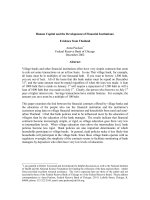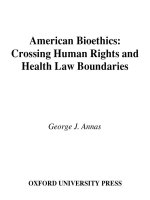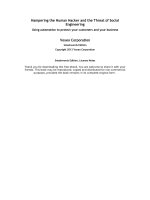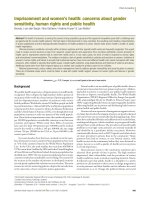- Trang chủ >>
- Cao đẳng - Đại học >>
- Luật
Human rights and private life of one person
Bạn đang xem bản rút gọn của tài liệu. Xem và tải ngay bản đầy đủ của tài liệu tại đây (53.23 KB, 6 trang )
Human rights and fundamental rights are the basic rights that everyone is entitled to have.
1. Define
Private life is considered in a very broad concept and depends on different situations. It covers a
wide range of issue including information, photographs, medical data, fingerprinting, telephone
tapping, and official records. It might be seen as the "right to be left alone". Human beings need
a kind of sphere in which they are guaranteed to be free of interference or surveillance by
government.
The development of intellectual faculties through reading, private conversation, writing
privately. The right to form intimate relationships. You control over what type of information you
choose to disclose to other people.
The right to private life means that you have the right to carry on your life privately, without
government and any other people interference, as long as you also respect the rights of other
people. That means media and others can be prevented from interfering in your life. It also
means that the personal information about you (official records, photographs, letters, diaries,
medical records…) should be kept securely, and not shares without your permission, except in
certain circumstances that will be discussed below.
2. Protection scope of private life
Laws govern the right to respect for private life.
The international has concerned the issue of respecting for private life for a long time.
Recognizing the inherent dignity, equal, and inalienable rights of all members of the human
family is the foundation of freedom, justice and peace in the world, Universal Declaration of
Human Right says in Article 12 of Universal Declaration of Human Rights (UDHR) says that:
"no one shall be subjected to arbitrary interference with his privacy home, and correspondence,
nor to attacks upon his honor and reputation. Everyone has the rights to the protection of the law
against such interference or attacks". This is to say this article does not post a human right to all
these things as a deed, but implies that every one such inherent right because they are said to
have the right to be protected against interference in this realm of privacy. Then we have
International Covenant on Civil and Political Rights (ICCPR) provides on the Article 17 that “1.
No one shall be subjected to arbitrary or unlawful interference with his privacy, family, or
correspondence, nor to unlawful attacks on his honor and reputation. 3. Everyone has the right to
the protection of the law against such interference or attacks".
Particularly the Convention for the Protection of Human Rights and Fundamental Freedom, in
Point 1 Article 8, says that “Everyone has the right to respect for his private and family life, his
home and his correspondence”
Finally we have the Charter of Fundamental rights of the European Union govern this issue in
Article 7 “everyone has the right to respect for his or her private and family life, home and
communications” and Article 8 “1. Everyone has the rights to the protection of personal data
concerning him or her.”
In the aspect of internal law, each state shall have its own rules or laws govern the right to
respect for private life.
The fourth amendment to the constitution of the United States says that "the rights of the people
to be secured in their persons, housed, papers and effects, against unreasonable searches and
seizure, shall not be violated".
The 2013 Constitution of the Socialist Republic of Vietnam, in Article 21, says that: “everyone
has the right to inviolability of private life, personal secrets and family secrets; and has the right
to protect his or her honor and reputation. The security of information about private life, personal
secrets or family secrets shall be guaranteed by law. 2. Everyone has the right to privacy of
correspondence, telephone conversations, telegrams and other forms of private communication.
No one may illegally break into, control or seize another’s correspondence, telephone
conversations, telegrams or other forms of private communication.”
Also the Civil Code of Vietnam provides in Article 31 that: “1. an individual shall have the right
with respect to his/her picture.”
Circumstances under which the right to respect for private life is limited.
It needs to be assumed that the protection of privacy is not absolute. However, competent
agencies shall gather information relevant to private life of a person when it is necessary and to
ensure the interest of public. Letter shall be delivered directly to the recipients without being
opened. Any spying on personal conversation of any kind shall be strongly prohibited. Inspection
of the family of a person shall be limited, and do such when necessary with solid existing
evidence or proof. Gathering and storing information regard to individual by any competent
person, organization, agencies shall be governed by law. These limitations are stimulated
differently in each state legal system, but generally cover the following circumstances:
-
Protection of national security
Protection of public safety
Protection of the economy, health and moral
Protection against disorder and crime
Protection of the rights and freedom of other people.
Article 4 of the International Covenant on Economic, Social, and Cultural Rights (ICESCR) says
“the State Parties to the present Covenant recognize that, in the enjoyment of those rights
provided by the State in conformity with the present Covenant, the State may subject such rights
only to such limitations as are determined by law only in so far as this may be compatible with
the nature of these rights and solely for the purpose of promoting the general welfare in a
democratic society.” Conditions set out in article 4 ICESCR shall satisfiy following
requirements:
- The limitation must be regulated in each state legal system.
- The limitation set out shall not be contrary to the characteristic of limited rights.
- The limitation shall be set out when it is necessary to accelerate public interest.
Duty
to
protect
private
life
the duty to protect private right initially belong to states, competent agencies and organization
and all individual shall have the obligation to respect other private life.
Why
do
we
need
to
respect
for
private
life?
Disclose the information that someone want to hide can make them upset, affected and violated
every state has its own boundaries and sovereignty so that it can maintain the state development
policy, decide on its own. The same thing shall be apply to individuals. Absolutely everyone
should have their own personal boundaries. Unlike state boundaries, personal boundaries are
abstract, intangible and likely to be violated. Once they are infringed, it is mostly impossible for
them to return ordinary.
Almost everyone, including you, experienced violation of their private life. Our parent are too
much taking care of us, people out there want to know about our life, the curious or business
spying wants to explore our personal information, personal record. In the world like this, we are
not
safe,
as
well
as
our
life.
If we want our private life to be respected, initially we need to respect others private life. We all
have secrets that we do not want to be disclosed.
Inviolability
The
laws
and
providing
the
privacy
right
to
respect
rights:
for
private
life.
a human rights system can be said to consist of: a list of internationally guaranteed human rights;
permanent
institutions;
International
compliance
approaches
to
or
human
enforcement
rights
procedures.
implementation:
- prescribing (defining, formulating) human rights. The drafting of human rights standards that
are universally acceptable is necessarily an awesome task because the words must be carefully
chosen
if
they
are
to
be
understood
and
taken
seriously.
- promoting (advocating) human rights. the second UN task is the promotion of human rights, by
which is meant campaigns to "market" or "sell" human rights, to increase knowledge about, and
secure public support for, international human rights instruments such as the two covenants and
the many more specialized covenants and declaration promulgated since UN effort to promote
human rights include information exchanges, educational training courses, the establishment of
fellowship for human right scholars, programs of the United Nation university studies.
- protecting (applying, enforcing) human rights. in principle, international human rights
conventions have the task of directly enforcing their standards to the states parties, the states
parties are themselves expected to enact the legislation and other measures that are necessary for
implementation. But UN again typically plays a supervisory role in such implementation, and
they can be graded from "weak" to "strong" depending upon how directly and swiftly they
respond
to
complaints.
The content of human rights: three generations of rights: civil and political rights; economic,
social and cultural rights; solidarity rights.
the right to privacy is difficult to define but has come to include a wide range of overlapping and
interrelated rights protecting the individuals freedom as long as his/her action do not interfere
with the rights and freedoms of other. the right to privacy is the right to individual autonomy that
is violated when state interferes with, penalized or prohibit actions which essentially only
concern
individual.
The right to privacy: person's intimacy, identity, name, gender, honor, dignity, appearance,
feelings, sexual orientation, home, family and correspondence.
The practice of the protection of privacy
Social networking site Facebook is being sued for allegedly scanning private messages and
selling on the data. Facebook now faces fresh allegation about violating user's rights by reacting
and
sharing
information
gathered
from
personal
message
without
their
consent.
the recent lawsuit was filed by Facebook user's Matthew Campbell and Michael Hurley citing
independent research which claims that, when users share a link to another site, facebook scan it
in order to build a profile of the user's activity and sell this information on to advertisers.
Critics suggest that facebook has access to information that data aggregators are unlikely to find
elsewhere. If user believe they are communicating in private, they are more likely to reveal
private information that they would not reveal if they knew they were being monitored.
Last September facebook was criticized over a proposed change in its privacy policy which
would have allowed names and profile pictures of users to be used in ads. Also in 2011, legal
action force facebook to compensate users who claimed their data had been used without their
permission in a $ 20 million payout.
Now Facebook will face a new legal challenge from Europe that will prohibit the company from
using
user's
information
to
produce
bespoke
advertising.
The new directive from the European Commission would mean that FB would be unable to sell
individual information to advertisers without permission. If the social network failed to comply
with the new law, expected to be introduced in January 2012, it could face legal action or large
fine.









